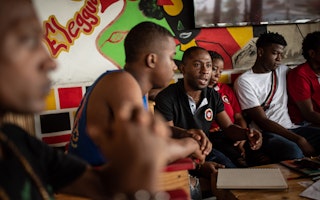Q&A: The Woman Who Challenged Brazil’s Abortion Taboo

Last year, Anis: Institute of Bioethics, Human Rights, and Gender put out a call on Facebook asking women to tell their stories about abortion in Brazil. More than 200 came forward in just 19 days. Brooke Havlik, communications officer at the Open Society Foundations, spoke with Luciana Brito of Anis about what happened next.
Is abortion legal in Brazil?
In Brazil, abortion is a crime that carries a prison sentence—with exceptions only for rape, risk to a woman’s life, or a diagnosis of fetal anencephaly. The punishment for a woman who obtains an abortion outside of these circumstances can be up to three years in prison.
How do the current abortion laws impact women in Brazil?
One in five women in Brazil below the age of 40 has had at least one illegal abortion. Every year, almost 500,000 women in Brazil undergo clandestine abortions. They are exposed to unsafe situations, and almost half are admitted to hospitals for post-abortion care. Because abortions are performed in illegal circumstances, there are no reliable statistics on how many women end up dying.
Do women in Brazil speak openly about abortion?
Even though abortion is a common experience in the lives of Brazilian women, it is usually kept secret. Women fear being judged, arrested, or mistreated, so the topic is taboo, and they do not share their stories. Despite the requirement of professional confidentiality, it is not uncommon for doctors and nurses to report women to the police when they arrive at hospitals seeking emergency care for complications from unsafe abortions.
Who is challenging this culture of silence?
Rebeca Mendes is a 30-year-old Brazilian woman living on the outskirts of São Paulo. In October 2017, Rebeca became pregnant while she was switching to a new contraceptive method. She wanted to undergo a legal and safe abortion in Brazil within the first trimester, and she needed permission from the government to obtain a legal abortion.
My organization, Anis, received Rebeca’s story through Facebook and submitted her petition as part of a pending constitutional case which calls for the decriminalization of abortion in Brazil up to the 12th week. Rebeca became the first Latin American woman to demand a legal abortion, to preserve her health and dignity, in the Brazilian Supreme Court.
How did the court rule?
Justice Rose Weber—one of the two women who sit on Brazil’s 11-member Supreme Court—denied her request on procedural grounds, but she did not rule on the merits of Rebeca’s request.
However, Rebeca would not give up: she also filed a writ of habeas corpus in local court in an attempt to secure her right to an abortion in Brazil. While she was waiting for a decision, she was invited to Colombia to talk about her experience. Rebeca obtained an abortion in Columbia and returned to Brazil after the abortion.
Unlike Rebeca, very few women will have the opportunity to travel to foreign countries that provide abortion care, especially lower-income Brazilians.
How does the criminalization of abortion impact human rights?
Rebeca’s mental health was impacted as a result of not being able to make the decision about her own life. She felt tortured, and according to the psychiatric report that accompanied her petition to the Supreme Court, Rebeca was experiencing acute stress.
Rebeca is the breadwinner of her family. She wanted to have the right to decide what is best for them. The expert attested that maintaining the pregnancy against her will would have had negative impacts not only on her but also on her two children, who are dependent on her care: Thomas, who is nine years old, and Felipe, who is six years old.
Could reform lead to safer abortions for women in Brazil?
Brazilian abortion law is one of the most restrictive in the world. The criminalization of abortion not only causes preventable injuries and deaths, but it also affects legal abortion services. Fearing criminal charges, doctors and health professionals often feel as if they must make sure patients seeking abortions are “telling the truth,” which leads to a hostile health care environment.
Reforming the law is the first step to ensure that every woman has informed and free access to safe and legal abortion services.
What is the legacy of Rebeca’s experience?
I hope that Rebeca’s story will always be remembered, as it represents a significant change in the litigation and advocacy strategies that we pursue in Brazil for the decriminalization of abortion and protection of women’s lives.
It is time to tell more women’s stories, and to ensure that abortion is a part of the public and political debates. I know that telling stories is not enough to guarantee rights, but it is certainly a step towards eventually recognizing them.
Anis: Institute of Bioethics, Human Rights, and Gender is a grantee of the Open Society Foundations.


